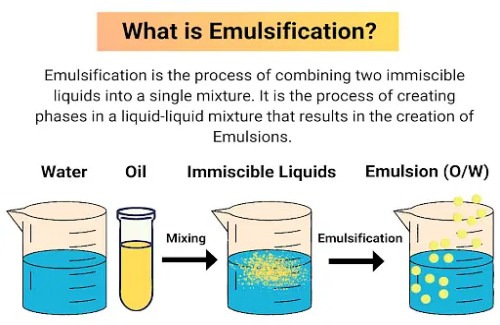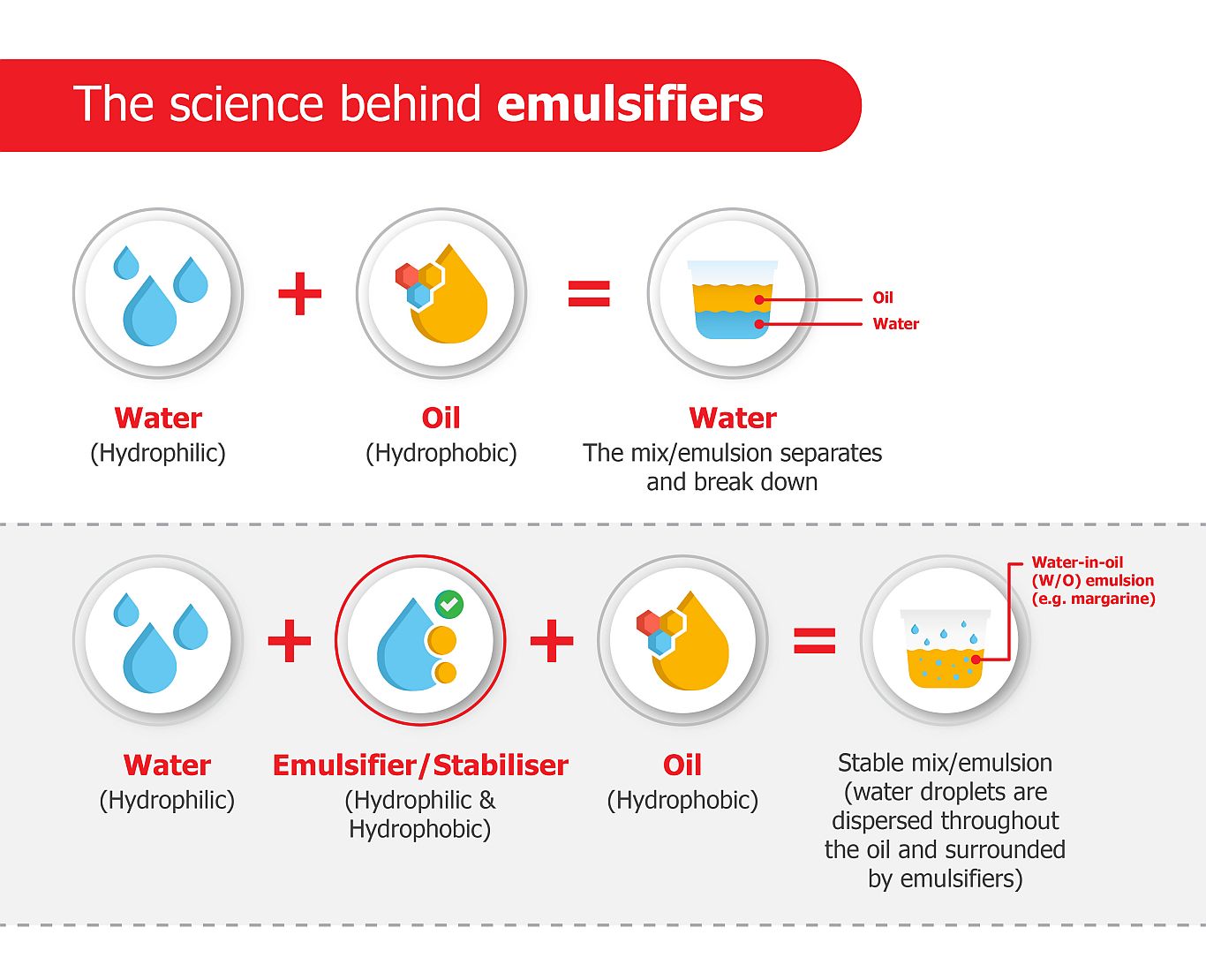How Emulsifiers Drive Quality Control in Manufacturing
How Emulsifiers Drive Quality Control in Manufacturing
Blog Article
The Science Behind Emulsifiers and Their Value in Modern Production
Emulsifiers play an important duty in contemporary manufacturing, acting as the unhonored heroes that blend oil and water for a large variety of items. You could not understand how these compounds boost texture and stability, but their influence is substantial throughout markets. As customer preferences shift towards cleaner labels, the demand for ingenious emulsifiers is expanding. What does this mean for the future of item formulation? Let's check out additionally.
What Are Emulsifiers?
Emulsifiers are essential agents in the globe of food and item production, acting as the glue that binds 2 otherwise immiscible liquids, like oil and water. Common instances include lecithin found in egg yolks and soybeans, and mono- and diglycerides used in various refined foods.

When you whip up a salad clothing or indulge in a velvety dessert, emulsifiers assist preserve that ideal structure. Without emulsifiers, several foods would separate, leading to unwanted appearances and tastes.
The Chemistry of Emulsification
When you blend oil and water, you could notice they do not blend easily; that's where the chemistry of emulsification enters play. Emulsification occurs when little droplets of one liquid disperse in another, creating a stable blend. This happens because oil and water are immiscible due to their differing polarities-- water is polar while oil is non-polar. To conquer this difficulty, emulsifiers are used.
When you include an emulsifier, its molecules position themselves at the oil-water interface, reducing surface tension and enabling the droplets to mix. The emulsifier develops a safety layer around each droplet, preventing them from coalescing back into separate layers.
Types of Emulsifiers
Various kinds of emulsifiers play vital roles in stabilizing blends of oil and water. All-natural emulsifiers, like lecithin from egg yolks or soy, are obtained from plants and animals, making them popular in food items.
On the other hand, artificial emulsifiers, such as mono- and diglycerides, are chemically crafted to improve stability and life span. They're commonly made use of in refined foods and cosmetic items.
In addition, you could encounter non-ionic, anionic, and cationic emulsifiers, each with unique residential or commercial properties that influence their performance. Non-ionic emulsifiers, as an example, job well in a large range of pH degrees, while anionic emulsifiers have a tendency to execute better in alkaline problems. Understanding these kinds can help you pick the best emulsifier for your specific application.
Mechanisms of Emulsion Development
Comprehending how emulsions form is essential for creating stable combinations of oil and water. When you present an emulsifier, it decreases the surface area tension in between the 2 liquids, enabling them to mix even more easily.
The emulsifier particles have a hydrophilic (water-attracting) head and a hydrophobic (oil-attracting) tail. When you include an emulsifier, these particles prepare themselves at the oil-water interface. The hydrophilic heads connect with water, while the hydrophobic tails anchor right into the oil. This develops an obstacle that maintains the beads, preventing them from integrating.
Applications of Emulsifiers in Numerous Industries
Emulsifiers play a crucial function throughout numerous sectors, making your preferred foods smoother and extra satisfying. In cosmetics, they improve product structure and security, guaranteeing a pleasurable application experience. see page And also, in drugs, they aid provide necessary components properly, enhancing general efficacy.
Food Market Utilizes
While you might not realize it, emulsifiers play a vital function in the food market, improving the structure, stability, and shelf life of numerous products. In baked goods, emulsifiers boost dough handling and preserve dampness, resulting in a far better appearance and prolonged freshness. By guaranteeing uniformity and quality, emulsifiers are significant to delivering the scrumptious items you take pleasure in every day, making them a crucial active ingredient in contemporary food manufacturing.
Cosmetic Solutions Advantages
When it comes to cosmetic formulas, emulsifiers are vital for producing items that feel extravagant and perform successfully. You'll see that emulsifiers enhance item security, avoiding splitting up and lengthening shelf life. Generally, emulsifiers play an important role in providing high-quality cosmetic products that satisfy your appeal demands.
Pharmaceutical Applications Introduction
In the review pharmaceutical sector, emulsifiers are important for developing reliable drugs. They help create steady blends of oil and water, making certain that active ingredients are evenly distributed and quickly soaked up by the body. You'll locate emulsifiers in various dosage forms, like creams, ointments, and liquid suspensions, improving the bioavailability of medicines. They also improve the texture and stability of products, making them much more attractive and less complicated to use.
The Influence of Emulsifiers on Item High Quality

By guaranteeing steady solutions, you minimize the threat of perishing and extend life span, inevitably conserving you time and money. You'll also locate that emulsifiers can boost the bioavailability of energetic components in your items, making them a lot more reliable for customers.
Additionally, they allow you to produce ingenious formulas that meet diverse customer demands. Whether you're crafting a luscious clothing or a lavish cream, emulsifiers are crucial for attaining the wanted outcomes. In short, by comprehending and leveraging the effect of emulsifiers, you can significantly elevate the quality of your items.
Future Patterns in Emulsifier Advancement
As the demand for cleaner over here labels and sustainable items climbs, the advancement of new emulsifiers is readied to progress significantly. You'll notice a change towards plant-based and natural emulsifiers, driven by customer preferences for ingredients that are eco-friendly and less refined. Developments in biotechnology will likely enhance the functionality and performance of these emulsifiers, enabling producers to create steady formulations with fewer ingredients.
You might additionally see a boost in multifunctional emulsifiers that not just support solutions however also improve taste, structure, or dietary value. This fad can streamline ingredient listings while enhancing item performance.
Additionally, with advancements in nanotechnology, emulsifiers can be engineered at the molecular degree to achieve unmatched security and efficiency. Emulsifiers. As you discover these trends, you'll locate that the future of emulsifier development is not almost performance, yet also regarding welcoming sustainability and transparency in components
Frequently Asked Concerns
Are Emulsifiers Safe for Intake in Food Products?
Yes, emulsifiers are generally risk-free for intake in food products. They've been thoroughly researched and approved by food security authorities, so you can appreciate your favorite foods without worrying regarding their influence on your health.
Can Emulsifiers Be Derived From All-natural Resources?
Yes, you can acquire emulsifiers from natural sources. Components like lecithin from egg yolks or soybeans and casein from milk are usual. These natural emulsifiers help support blends without artificial ingredients, making them popular in different products.

How Do Emulsifiers Impact Shelf Life of Products?
Emulsifiers maintain blends, preventing splitting up and spoilage - Emulsifiers. By keeping uniformity, they prolong items' service life, making sure freshness and quality. You'll observe that emulsifiers assist maintain your favorite foods and cosmetics doing more than time
What Are Potential Adverse Effects of Emulsifiers?
You could experience gastrointestinal problems when consuming items with emulsifiers, as they can disrupt digestive tract germs. Some researches suggest potential links to inflammation or allergic reactions, yet more research is needed to completely recognize these results.

Exist Alternatives to Conventional Emulsifiers?
Yes, there are choices to traditional emulsifiers. You can check out options like natural gum tissues, starches, or lecithin. Each alternative offers one-of-a-kind residential properties, so experiment to find what works best for your details application.
Report this page